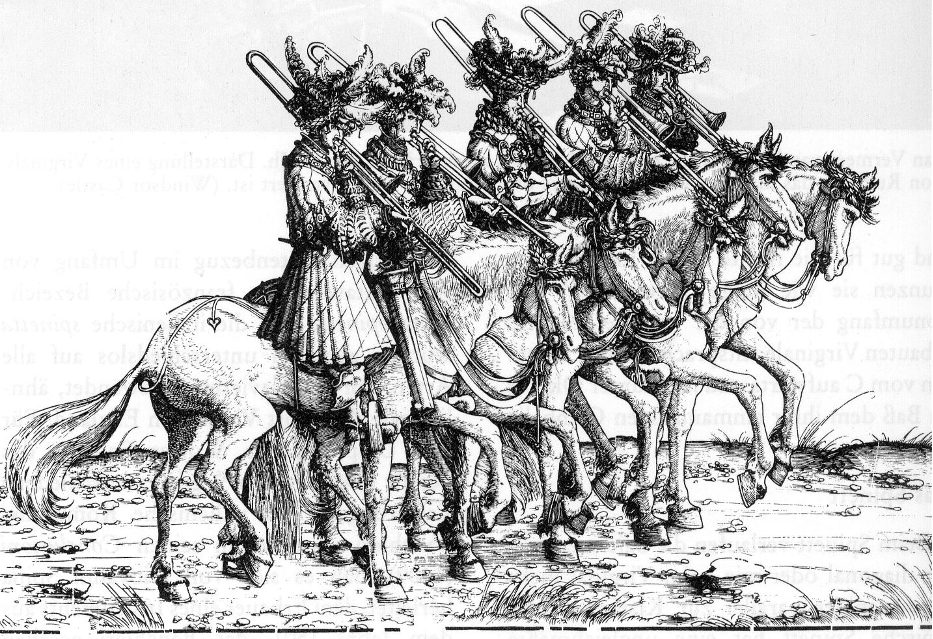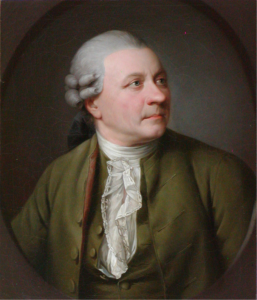For the infinite being
(Poet's title: Dem Unendlichen)
Set by Schubert:
D 291
Schubert omitted the words in italics[September 15, 1815]
Wie erhebt sich das Herz, wenn es dich,
Unendlicher, denkt! Wie sinkt es,
Wenn es auf sich herunter schaut!
Elend schaut’s wehklagend dann, und Nacht und Tod!
Allein du rufst mich aus meiner Nacht, der im Elend, der im Tode hilft.
Dann denk ich es ganz, dass du ewig mich schufst,
Herrlicher, den kein Preis, unten am Grab, oben am Thron,
Herr, Herr Gott, den dankend entflammt, kein Jubel genug besingt.
Weht, Bäume des Lebens, ins Harfengetön,
Rausche mit ihnen ins Harfengetön, kristallner Strom!
Ihr lispelt und rauscht, und Harfen, ihr tönt
Nie es ganz, Gott ist es, den ihr preist.
Donnert, Welten, in feierlichem Gang, in der Posaunen Chor!
Du Orion, Wage, du auch!
Tönt all ihr Sonnen auf der Straße voll Glanz,
In der Posaunen Chor.
Ihr Welten, ihr donnert,
Und du, der Posaunen Chor hallest
Nie es ganz, Gott, nie es ganz, Gott,
Gott, Gott ist es, den ihr preist.
How the heart rises up when it
Thinks of you, infinite being! how it sinks
When it looks downwards to itself!
Lamenting, it then sees wretchedness, night and death!
Only you call me out of my night, helping me in wretchedness and in death!
Then I realise that you are eternally creating me,
Majesty, whom no praise, below in the grave or up by the throne,
Lord Lord God, to whom not enough praise can be sung, burning with thanks.
Sway, trees of life, to the sound of the harp!
Crystal stream, murmur along with the sound of the harp!
You whisper and murmur, and, you harps, you are sounding,
But never fully! It is God whom you are praising!
Thunder out, worlds, in a festive procession, in a brass band!
You, daring Orion, you too!
Ring out, all you suns on the brightly shining road,
With the brass band!
You worlds, you thunder,
And you, choir of trombones, you never resound
Fully: God – never fully: God,
God, it is God whom you are praising!
All translations into English that appear on this website, unless otherwise stated, are by Malcolm Wren. You are free to use them on condition that you acknowledge Malcolm Wren as the translator and schubertsong.uk as the source. Unless otherwise stated, the comments and essays that appear after the texts and translations are by Malcolm Wren and are © Copyright.
☙
Themes and images in this text:
Eternity Graves and burials Harps and Aeolian harps Hearts High, low and deep Laments, elegies and mourning Night and the moon Rivers (Strom) Thrones Thunder and lightning Trees (general) Trombones Trumpets
‘Infinity’ has always been a difficult concept since it can only be conceived of in negative terms. It is the not-finite, that which has no boundary, that which is endless. We know our limits and we use these to help us think of a reality without the same constraints. As this poem puts it, there is a difference between looking down at ourselves and our limited, bounded, mortal selves and looking up and outwards towards everything that is not similarly restricted, to the in-finite, to all that is un-ending.
Wie erhebt sich das Herz, wenn es dich,
Unendlicher, denkt! wie sinkt es,
Wenn’s auf sich herunterschaut!
It is tempting to translate the German noun / adjective ‘der Unendlicher’ as ‘the infinite one’, but this will not do, since the infinite reality we are attempting to understand is not a normal number and cannot be ‘one’.
The infinite being or reality that we become aware of when we think about our limitations (according to Klopstock) is our creator. I call on this infinite being when I am miserable and conscious of my mortality, but this leads me to realise something about the nature of eternity: ‘Dann denk’ ich es ganz, daß du ewig mich schufst’ (I come to realise that you are eternally creating me). Since I am mortal, this cannot mean ‘you have made me eternal’ (as some published English translations of the poem put it); rather it is a reference to the difficulty of understanding how an infinite creator can relate to the finite dimensions of a created world, and the doctrine of ‘eternal creation’ formulated by a number of theologians (in both the Greek and Latin traditions), who argued that although God has created the world (and time with it) he has never stopped doing so. At all moments he is still Creator and the world continues to be created at every moment. I am being created now; this is part of what God’s infinity and my finitude involves.
At every moment my existence depends completely on God, which is why we owe him infinite gratitude and praise. The song of praise that we raise is never sufficient. The natural world needs to join in: the trees have to sway, the brook has to babble and the stream has to surge as part of the musical ‘movement’ of praise. The harps may well be those played by the angelic orchestra in heaven, but the finite world on earth needs to join in to make the music complete (not that it ever can be fully complete, since we are dealing with infinity). The music cannot be static; we need to join a procession (time and space are both involved in this attempt to praise the infinite – the non-static and the non-temporal). As well as harps (strings), we need voices and wind instruments, a chorus of trombones (a brass band, in effect). Klopstock was writing at a time in the mid 18th century when Pietist Protestant congregations were beginning to use brass bands (not just trombones) in worship and in processions on festive occasions, so his reference to whole worlds processing ‘on a shining road to the sound of a chorus of brass instruments’ would have created a definite, down-to-earth image for his contemporaries. Although they can never resound ‘fully’, their definite, defined sound serves to lift our heart to the indefinite, the undefined, the infinite.

https://de.wikipedia.org/wiki/Posaunenchor#/media/File:Posaunenchor_1518.jpg
☙
Original Spelling Dem Unendlichen Wie erhebt sich das Herz, wenn es dich, Unendlicher, denkt! wie sinkt es, Wenn es auf sich herunterschaut! Elend schaut's wehklagend dann, und Nacht und Tod! Allein du rufst mich aus meiner Nacht, der im Elend, der im Tode hilft! Dann denk ich es ganz, daß du ewig mich schufst, Herrlicher! den kein Preis, unten am Grab´, oben am Thron, Herr Herr Gott, den dankend entflamt, kein Jubel genug besingt. Weht, Bäume des Lebens, ins Harfengetön! Rausche mit ihnen ins Harfengetön, krystallner Strom! Ihr lispelt und rauscht, und, Harfen, ihr tönt Nie es ganz! Gott ist es, den ihr preist! Donnert, Welten, in feyerlichem Gang, in der Posaunen Chor! Du Orion, Wage, du auch! Tönt, all' ihr Sonnen auf der Straße voll Glanz, In der Posaunen Chor! Ihr Welten, ihr donnert, Und du, der Posaunen Chor, hallest Nie es ganz, Gott; nie es ganz, Gott, Gott, Gott ist es, den ihr preist!
Confirmed by Peter Rastl with Klopstocks Oden. Erster Band. Leipzig bey Georg Joachim Göschen. 1798, pages 191-192; and with Oden von Klopstock. WIEN, gedruckt bey Joh. Thomas Edlen von Trattnern, k.k. Hofdruckern und Buchhändlern. 1784, pages 5859.
To see an early edition of the text, go to page 191 [209 von 356] here: http://digital.onb.ac.at/OnbViewer/viewer.faces?doc=ABO_%2BZ223304809


